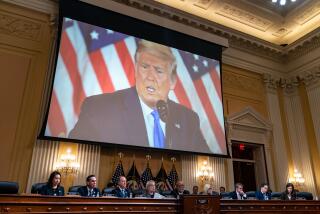National Security Needs More Than New Laws : Congress, Having the War Power, Should Have Seats on the NSC
- Share via
The report of the congressional inquiry into the Iran-Contra scandal was a bitter disappointment for those who hoped that last summer’s hearings might lead to a serious effort at reforming the exercise of the Constitution’s war powers.
The Tower Commission report of last February had already delivered a ringing indictment of the Reagan Administration.
But what the earlier report lacked was an adequate set of recommendations. That was the congressional group’s opportunity: to present a plan for restoring checks and balances to the conduct of national-security affairs. What we got instead was a detailed list of proposals for fine-tuning the laws that govern the reporting of covert activities.
It is a futile exercise. Why should we expect future officials to respect the laws any more faithfully than President Reagan’s appointees did?
The President says that “out of this experience has come a new wisdom about the process of governing in America.” If we could safely rely on the wisdom of public officials, we would not need a Constitution.
It was one of the framers’ most fundamental goals to establish a system in which no one person could take this nation to war. Is there any way to force a President, and those who serve at his or her pleasure, to share this awesome power?
Rules of law can never be sufficient. Congress cannot deny the need for exceptions to rules about reporting covert activities. As soon as exceptions are granted, foolish people in the White House will be able to find loopholes for misbegotten activities.
Is there any way to make the White House want to consult with political adversaries before undertaking major initiatives in foreign policy?
One way would be to revise the organic statute that created the National SecurityCouncil. Passed in 1947, it names four members to the council, besides the President and the vice president: the secretaries of state and defense, the director of the Central Intelligence Agency and the chairman of the Joint Chiefs of Staff. In addition, the President may invite anyone else whose counsel he wants. The NSC director and staff serve at the President’s pleasure, without senatorial confirmation.
Congress should amend this statute to provide that four of its own members serve on the NSC. They should be appointed by the President (to avoid any implication that his ultimate responsibility for foreign relations is being compromised) with the understanding that he choose a bipartisan and bicameral representation.
There should be no problem with the constitutional provision that members of Congress may not hold any “office” in the executive branch. As the Tower Commission emphasized, the NSC is an advisory body. It has no administrative responsibilities. Members of Congress often serve on advisory bodies.
What would people like Sen. Bob Dole (R-Kan.), Sen. Sam Nunn (D-Ga.), Rep. Thomas Foley (D-Wash.), and Rep. Richard Cheney (R-Wyo.) bring to the NSC? Are they wiser, stronger people than Secretary of State George P. Shultz? No, they are not. The difference is that Shultz serves at the President’s pleasure. His ultimate leverage is to resign--which he apparently considered over the sale of arms to Iran.
Dole and his colleagues would have brought a different weight to bear. The President has no control over their place in government. They owe their political allegiance to their constituents and their fellow legislators.
Could the President circumvent a reconstituted NSC that opposed a plan that he was determined to carry out? Yes, he could. The reconstitution of the NSC is no panacea--any more than a Council of Economic Advisers guarantees that a President will heed sound economic counsel. But having members of Congress on the NSC would strengthen the hand of legislators who were convinced that a President was embarking on a foolish venture. They could confront him with the choice between going alone or modifying his tactics.
The Constitution and existing statutes no longer check the President’s war powers effectively. If we accept the notion that all we need is a new face in the Oval Office, we are merely setting the stage for a repetition of recent disasters, sooner or later.
Perhaps we can accomplish the needed structural change by revising organic statutes in the manner outlined here. If those efforts fail, however, we will have to consider more radical alterations in our constitutional architecture--or concede that national security is no longer compatible with constitutional governance.
More to Read
Get the L.A. Times Politics newsletter
Deeply reported insights into legislation, politics and policy from Sacramento, Washington and beyond. In your inbox twice per week.
You may occasionally receive promotional content from the Los Angeles Times.










